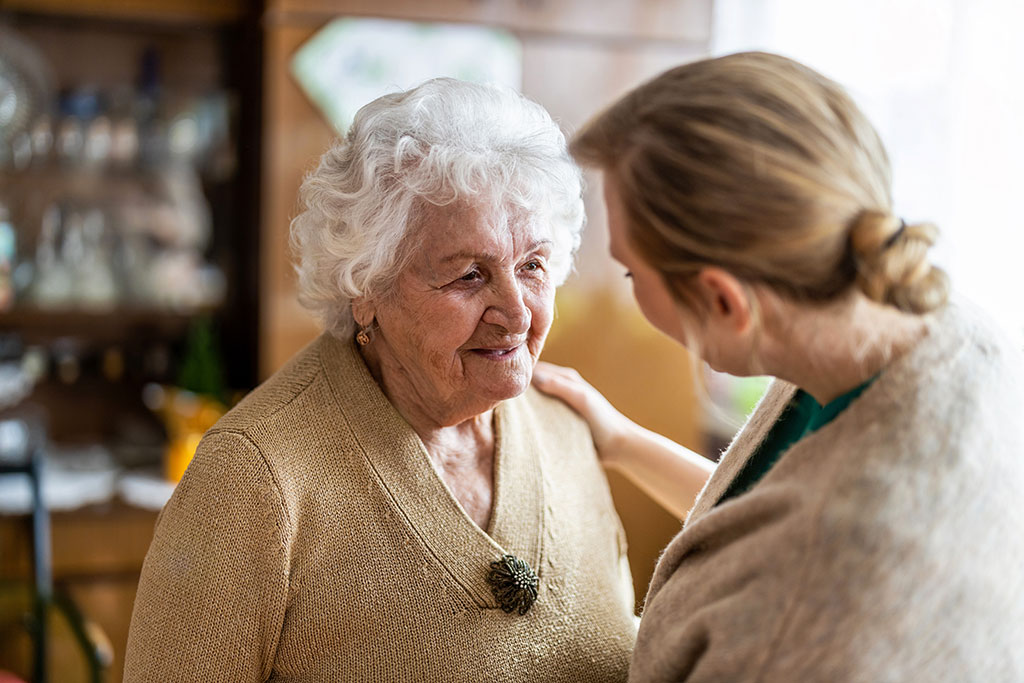Sundowner’s syndrome, also known as sundowning, is a term used to describe behavioural changes where individuals with dementia or cognitive impairment experience increased confusion and agitation in the late afternoon or evening hours. This condition is characterised by a worsening of symptoms as the day progresses, typically peaking at dusk or sunset, hence the name ‘sundowning’.
Dementia sundowning symptoms
Sundowning symptoms can vary from person to person but may include:
- Increased confusion and forgetfulness.
- Agitation, restlessness, or pacing.
- Anxiety or mood swings.
- Hallucinations or delusions.
- Aggressive behaviour.
- Difficulty sleeping at night.
What causes Sundowner’s syndrome and how is it treated?
The exact cause of sundowning is not fully understood and can present itself differently in each person. Therefore, managing sundowning can be challenging. We do know that there are several factors that may contribute to its occurrence in those with dementia and there are strategies we use to help reduce the impact these have one them. Here are some common contributors to sundowning and how they would typically be managed:
Circadian rhythm disruption and sensory overload
Changes in the brain’s internal body clock can lead to disturbances in sleep-wake patterns. As a result, individuals with dementia may become more disoriented and agitated during the evening hours when it’s dark outside.
Reduced sensory input during the evening can lead to heightened sensitivity to environmental stimuli, such as shadows, changes in lighting, or noise. These sensory challenges can be distressing for people with dementia.
At the Future Care Group, we maintain a consistent routine and a regular daily scheduled with structured activities and mealtimes to help stabilise a resident’s circadian rhythm. Plus, we always make sure there is adequate lighting in our homes to ensure that the environment is well-lit during the evening hours. This can reduce confusion and anxiety related to darkness.
We have also introduced a specialist lighting system in some of our homes to help regulate circadian rhythms. Disrupted sleep for people with dementia is very common and this form of light therapy is proving very beneficial.
Fatigue and end-of-day exhaustion
People living with dementia may experience fatigue as the day goes on, which can exacerbate confusion and agitation. The mental and physical exhaustion that accumulate over the course of the day may contribute to sundowning.
Disorientation and anxiety
As dementia progresses, individuals may become more disoriented and anxious when they cannot remember people, places, or events. This disorientation can be more pronounced during the evening hours.
At the Future Care Group, our carers are committed to providing the very best in dementia care and go above and beyond to understand a resident’s expressed behaviours and develop bespoke strategies to manage them in the most dignified and supportive way possible. We encourage residents with dementia to engage in calming activities such as music therapy, pet therapy, aromatherapy, or gentle exercises to help the individual relax. We make our living spaces comfortable and calming, surrounding them with familiar objects and soothing colours.
On top of that, our Namaste care provision sees us bringing residents into a dedicated Namaste environment when they need that time to calm down, reconnect, and find some balance. Namaste areas within our homes primarily focus on creating calm through gentle lighting, gentle music, and therapeutic touch. Our carers will just be with them in that moment.
Our in-house chefs and catering teams are trained and encouraged to provide residents with a nutritionally balanced diet. is the best it can be. On top of providing a nutritious diet for residents we recommend avoiding caffeine and large meals in the late afternoon or evening to aid with improved sleep and reducing agitation. We also work to improve the appearance of textured modified food and snacks to enhance the diet of those with swallowing difficulties associated with dementia.
We love meeting with residents to find out about their specific likes and dislikes and to learn what meals were personal favourites before dementia entered their lives. We can add them onto the menu for all residents to enjoy!
Medications
Some medications commonly prescribed for dementia may have side effects that worsen cognitive symptoms or agitation, especially in the evening.
Our in-house nursing team at each of the Future Care Group nursing facilities will review a person’s medications regularly and discuss any potential adjustments. This can minimise any side effects contributing to sundowning. As pioneers of digital health here at the Future Care Group, we have four very impressive systems/apps that help us manage a patient’s care during their stay with us.
It’s important to note that sundowning can be distressing for both the individual with dementia and their caregivers, and it may require a multi-faceted approach to manage effectively. As healthcare professionals specialising in dementia care, we can devote expert attention to managing sundowning and improving the overall quality of life for the individuals with dementia in our care.
Find out more about our dementia strategy here.
More information about our Dementia care offering can be found on our website.





